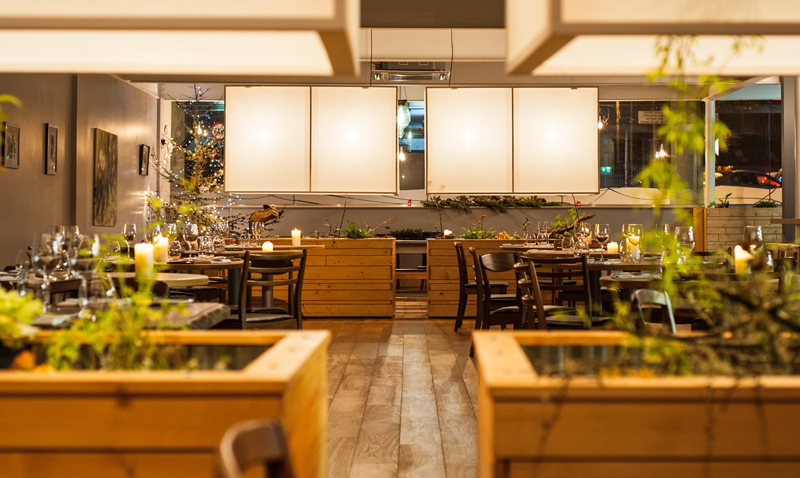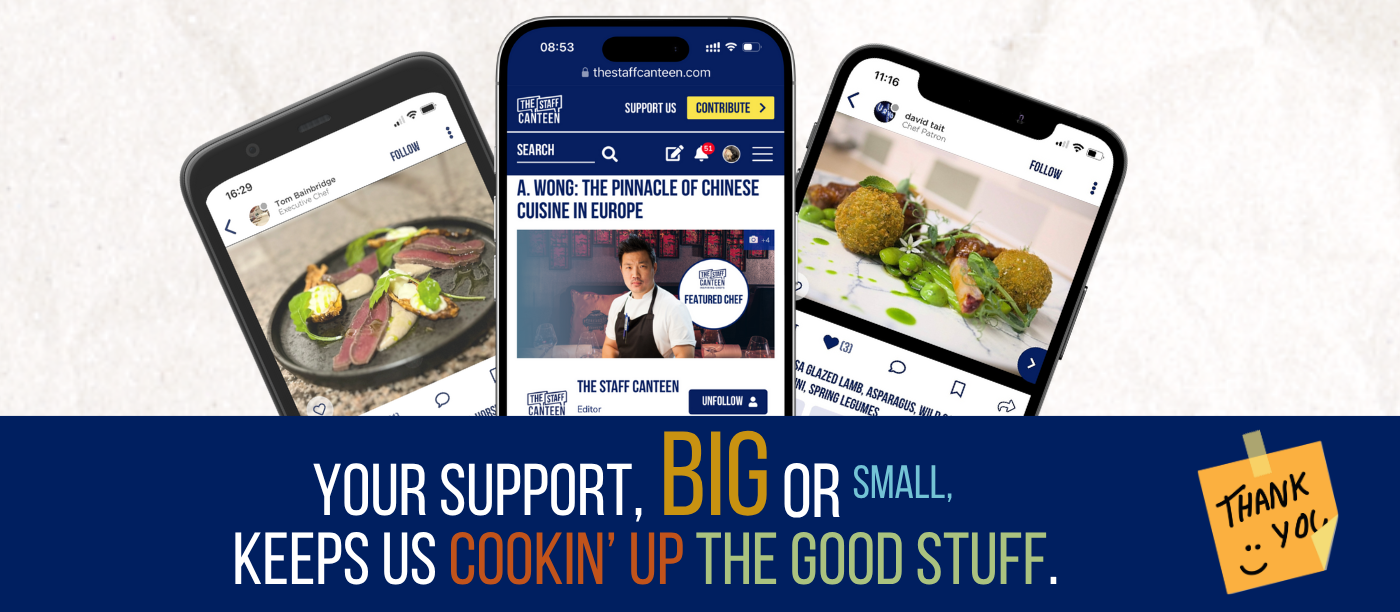"We're facing a huge crisis, so you have to play your part or f**k off" Enda McEvoy on sustainability

Chef Enda McEvoy opened Loam in Galway five years ago. It has since received numerous awards, including a Michelin star.
Last year it became the first restaurant in Ireland to earn a three star rating from the Sustainable Restaurant Association, and was the inaugural recipient of Michelin's sustainable restaurant award in the 2020 Guide.
What does sustainability mean?
"Sustainable means to sustain what's happening right now but that's not what you want to do. You want to be better."
The chef concedes that "it is kind of a trend, but it's more important than that.
"There's a responsibility on all business owners to be more mindful of what their practices are and how it affects - not only environmental effects or carbon footprint but how it affects people that work within your industry and around - how it affects people in your neighbourhood and how you fit in to your own neighbourhood as well."
The chef has found the SRA's auditing scheme to be very helpful; offering concrete advice and insight into how to become a more responsible restaurant owner.
"it's kind of a holistic approach to responsible business practices." he said.
Can you be sustainable and still ensure customer satisfaction?

sustainable restaurant award
Sustainability hasn't always been a concern for Enda.
"When I started off in restaurants, people were travelling to get the best ingredients around in markets on the continent as opposed to looking at what was available in your own country."
It often takes extreme situations for people to consider change, and that is exactly what happened to him.
"There was a huge volcano in Iceland, it shut down airports for days and days. We found it very difficult to get really simple things like vegetables and it was a real eye-opener for me to start to see where our ingredients were coming from."
After much thought into the practical considerations of how to buy locally, he shifted his approach and has worked in the same way since.
"When we set up [Loam], our main focus was to have a 'low-impact' restaurant" with regards not only to locality but also including waste reduction, energy and water saving," he said.
However, the bottom line is still to run a successful business and to have happy customers.
"We don't spend the whole time browbeating people when they come in the door and saying: 'this is what we do,' our main focus is to have a high-end progressive restaurant that people leave happy.
"It's not like an overly wholesome restrictive narrative."

Does running a sustainable business necessarily cost more?
Enda dismisses the idea that cost is an excuse not to be more mindful. For example, buying from small producers as they do at Loam might raise the cost of produce - but means the team have access to different parts of vegetables that they wouldn't usually use.
"You might think that it's financially more difficult but it's how you approach it."
"People who say: 'I can't afford to be more mindful in the way that I approach my business so I'm just going to leave things as they are; you can't do that anymore, you can't think about things that way anymore. There is no alternative."
"We're facing a huge crisis, so you have to play your part or f**k off."
"That's the bottom line, people have to be more responsible or face penalties or just stop doing what you're f***ing doing and just go away."
"There are no excuses. You can't be making excuses and expecting it to be okay. It's not going to be okay."
IS "Hyper-locality" limitING?
For Enda, using what's on your doorstep means you can understand the breadth of possibilities of a handful of ingredients. Hyper-locality doesn't have to be limiting if you treat local ingredients with techniques from far and wide.
"It's

down to your mentality isn't it - no-one's forcing people to work like this, in a hyper local sort of way but if you change your mentality and feel you're doing it as a choice for yourself, you'll find more joy in it."
The team at Loam takes it as a challenge and makes the most of it to experiment with processes like fermentation, making misos and garam.
As nervous as he was to get up on stage at the Michelin awards, Enda agrees that having been recognised as a sustainable business means he has a role to play in terms of advocacy.
"Especially in a time like this, you have to do what you think is right. I do take it seriously that we have a responsibility to be leaders in the way of responsible business ownership."
However, he said, it shouldn't rest on the shoulders of restaurants alone to address the big problems plaguing our food systems.

Who else should be accountable?
For Enda, the restaurant world is something of a bubble, where people can access ingredients and flavours most people don't eat everyday - meaning their realm of influence is limited.
"Supermarkets are a whole different thing altogether."
While - equally, supermarkets are cogs in a wheel, "the imperative is on the individual to make a change and that's unfair. It's all to the shopper, the consumer has to make changes, but they can only change so much. There's only so much available to them. It has to come from the top down."
What would reap more benefit and instigate change, he argued, would be government incentives for businesses to change.
"There's going to have to be a huge shift in the way we approach food systems in Ireland and in the UK and all across the world."
There is no simple way of fixing food systems
Veganism isn't going to save the planet, Enda asserted. Like buying local produce, it is an indication that people are ready for a change, but not a solution in itself.
In a world where a handful of people can afford to eat organic produce and others have to go to foodbanks to eat, where farmers are pressured into making their soil infertile and not dissuaded from selling off their land to big companies, unconcerned with the diversification of crops, "there has to be a huge change in how people react towards food."
DOES a responsible approach pay off?
The chef buys all of his produce from a handful of farms. While his meat supplier also sells produce on market stalls, his fruit and vegetable suppliers are bound to his restaurant, so he agrees to buy anything they grow.
"Now if it doesn't work or if there's some sort of a crop failure due to the weather, we still agree to buy the vegetables off them, as much as comes out of the ground. If the crop fails completely and it doesn't germinate, obviously we're not going to buy it."
"Generally it's not a problem, so we've already made a plan, we know what's going to come up, we know how much of everything there's going to be so we have a plan already for the following year."
"It makes life a lot easier."
The reason for this, he explained - besides the fact that "it's nicer to work with people you like and who like you" - was that big suppliers are prone to letting you down.
"You have a standing order, orders in for whatever vegetables you want and they ring you up the day before and say 'we've run out' or 'that didn't come in from whatever grocer's'."
WHAT CAN CHEF to implement sustainable practices in an existing business?
Daunting as the issue can be - on top of the many concerns involved in running a successful restaurant, chefs can make little helpful changes to become more sustainable, he explained.
"Question everything. Tin foil. You don't need tin foil in the kitchen. Cling film. You don't need cling film. Buy boxes with lids. Buy boxes that can be stored correctly, just be mindful of everything that you do."

For 17 years, The Staff Canteen has been the meeting place for chefs and hospitality professionals—your stories, your skills, your space.
Every recipe, every video, every news update exists because this community makes it possible.
We’ll never hide content behind a paywall, but we need your help to keep it free.
If The Staff Canteen has inspired you, informed you, or simply made you smile, chip in £3—less than a coffee—to keep this space thriving.
Together, we keep the industry connected. Together, we move forward.














